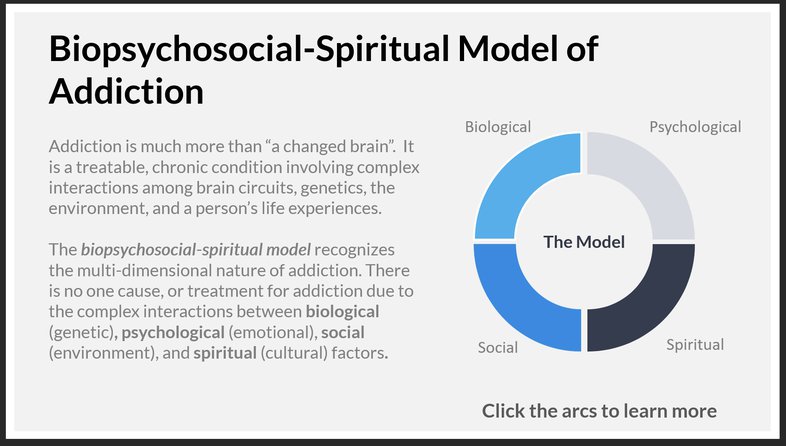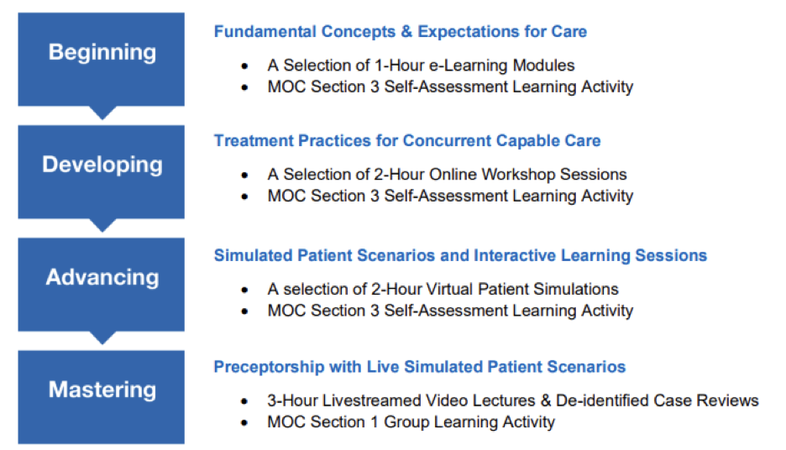The global COVID-19 pandemic combined with Alberta’s continuing opioid epidemic has led to an increased use of addiction and mental health services across the province alongside an increased difficulty in training staff.
To enhance knowledge and skills among health care workers and increase system capacity, the Alberta Health Services Addiction & Mental Health Practice Supports and Provincial Partnerships team created a variety of easily accessible, accredited, and free online training programs including the newly updated Alberta Opioid Dependency Treatment (ODT) Virtual Training Program and the Provincial AMH Curricula & Experiential Skills (PACES) Learning Pathway.
The Alberta ODT Virtual Training Program
The ODT Virtual Training Program was built as a component of broader efforts to respond to Alberta’s opioid crisis by improving the capacity of prescribers and allied health care providers involved in treating opioid use disorder. This accredited online course consists of interactive e-learning modules punctuated by video interviews with subject matter experts and experiential patient simulations (Entrustable Professional Activity Simulations) that allow learners to practice their critical thinking and clinical skills in a safe environment. The course is available anytime, anywhere, and without cost.
The course aligns with current evidence and national guidelines and satisfies the College of Physician & Surgeons of Alberta requirements for initiating and maintaining opioid agonist therapy (OAT). Some topics covered include an introduction to opioids and the opioid crisis, the impacts of opioids on the brain and body, comprehensive assessment and OUD, reducing harms associated with opioid use, opioid agonist treatment and OAT initiation, and comprehensive treatment & psychosocial interventions.

Entrustable Professional Activity Simulations (EPA-Sims)
Included in the Alberta ODT Virtual Training Program and PACES are a variety of experiential patient simulations built upon the framework of Entrustable Professional Activities (EPAs). Originally created by Olle ten Cate (ten Cate, 2005), EPAs were created to overcome barriers encountered when teaching the application of clustered competencies and to provide assurance that learners can be entrusted to practice an activity independently (ten Cate, 2013).
The ODT and PACES EPA-Sims feature interactive video-based simulations based on this foundation where learners are faced with several realistic clinical decisions. At each critical clinical decision point, the learner is requested to select how they would proceed by choosing from the de-identified options of not-entrustable, pre-entrustable and entrustable activities. The application of the most evidence-informed, appropriate, welcoming, and engaging treatment response (i.e.: an entrustable activity) is required for the learner to advance to the next clinical scenario, and immediate feedback is provided based on the learner’s selection. In short, learners can engage with real-life practice decisions via a virtual patient simulation and receive immediate feedback as to whether their choice was entrustable and why.
The online nature of these simulations provides a safe environment for learning and experimentation, and the EPA-Sim format helps to punctuate more traditional e-learning methods through experiential engagement. As of this writing, EPA-Sims in the ODT and PACES programs include:
- Conducting a Comprehensive Assessment for Opioid Use Disorder
- Responding to an Opioid Poisoning
- Initiating Opioid Agonist Treatment (OAT) with Buprenorphine-Naloxone (BUP/NLX): Home Induction
- Initiating OAT with Methadone: Pregnant Patient
- OAT – BUP/NLX Initiation in the Emergency Department
- Chronic Non-Cancer Pain: Comprehensive Assessment
- Chronic Non-Cancer Pain: Comprehensive Pain Management and De-Prescribing

The PACES Learning Pathway
The PACES Learning Pathway is an evolving learning program built to advance learners from a basic understanding to mastery of the competencies required to assess and treat primary addiction (substances and/or gambling) with concurrent psychiatric disorders and/or chronic non-cancer pain.
This free, accredited learning pathway provides self-paced, personalized addiction education for all skill levels and spans four sequential learning phases allowing individuals to develop their skills based on their unique learning needs. These phases include a variety of e-learning modules, online workshops, EPA-Sims, and live streamed video sessions with presentations from a range of subject matter experts and simulated de-identified case reviews. You can get started here.
PACES meets academic standards for MOC Section 3/ Mainpro+ Self-Assessment accredited learning through the Royal College of Physicians and Surgeons of Canada and the College of Family Physicians of Canada; as well as continuing education units through the Canadian Addictions Counsellors Certification Federation to support continuing competency requirements of Alberta’s regulatory colleges including, but not limited to the Alberta College of Social Workers, College and Association of Registered Nurses of Alberta, and Alberta College of Pharmacy.
As an evolving pathway, new course material is being added to PACES on an ongoing basis. The team is expanding the Developing pathway with new course material, and new EPA-Sims are also in development. PACES will evolve alongside current knowledge and practice to best support learners and system capacity now and into the future.
For further information on these courses or to provide feedback, please contact [email protected].
Banner image: Pixabay.com
